Mental Health Assessment Report: Holistic Care, Nurses' Roles, Factors
VerifiedAdded on 2020/04/29
|17
|5196
|104
Report
AI Summary
This report provides a comprehensive analysis of a mental health assessment, emphasizing the importance of patient-centered care and the roles of nurses in the assessment process. It delves into the prioritization of mental health care, the factors that ensure holistic provision, and the significance of communication and physical illness assessment. The report highlights the interconnectedness of these elements in providing effective care for mentally ill patients, referencing Neuman's Systems Model and the importance of crisis intervention teams. It also explores the roles of nurses in communication, physical illness assessment, and family counseling, underscoring the need for a holistic approach to address the complex needs of individuals like Tom. The report references a range of academic sources to support its arguments and provides a thorough overview of the key aspects of mental health assessment and care.
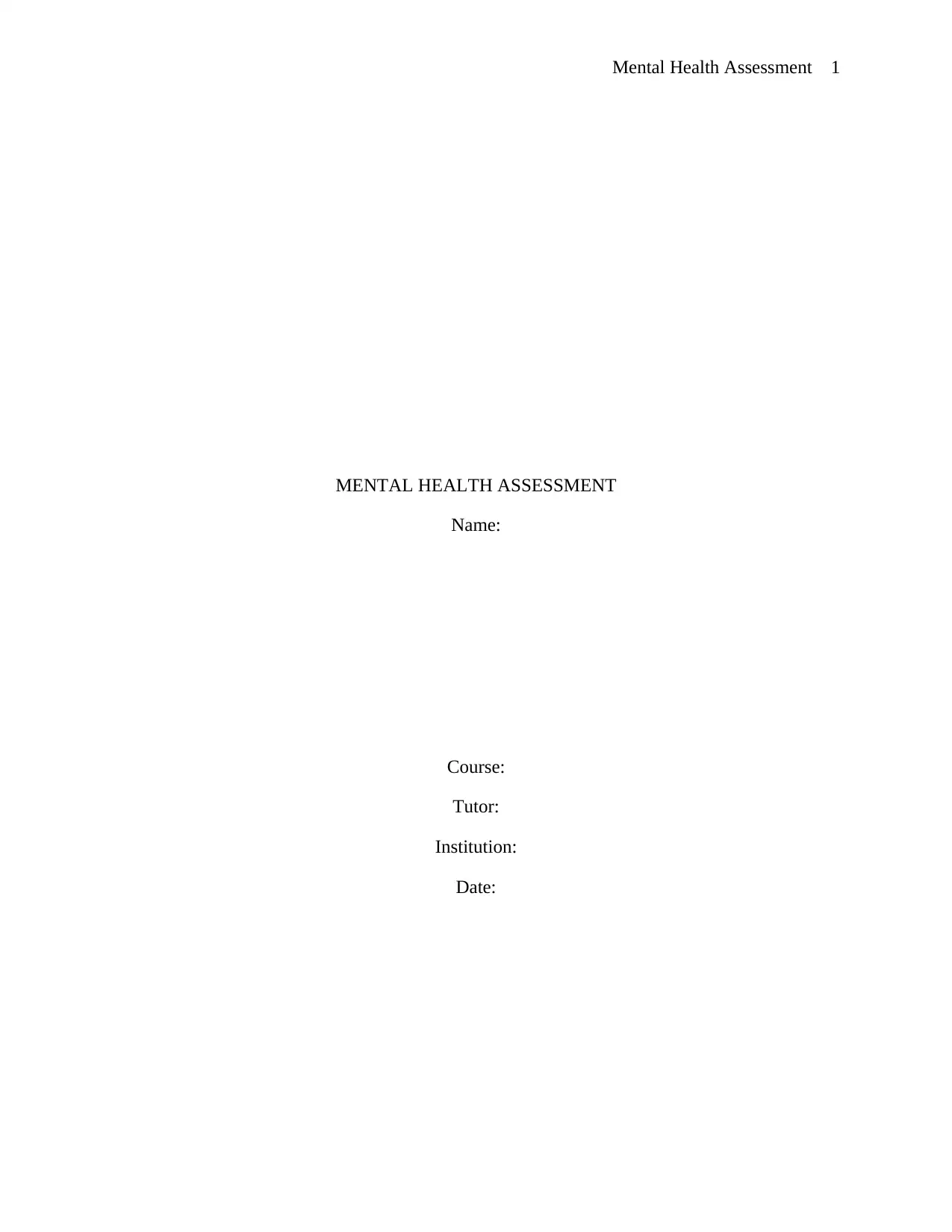
Mental Health Assessment 1
MENTAL HEALTH ASSESSMENT
Name:
Course:
Tutor:
Institution:
Date:
MENTAL HEALTH ASSESSMENT
Name:
Course:
Tutor:
Institution:
Date:
Paraphrase This Document
Need a fresh take? Get an instant paraphrase of this document with our AI Paraphraser
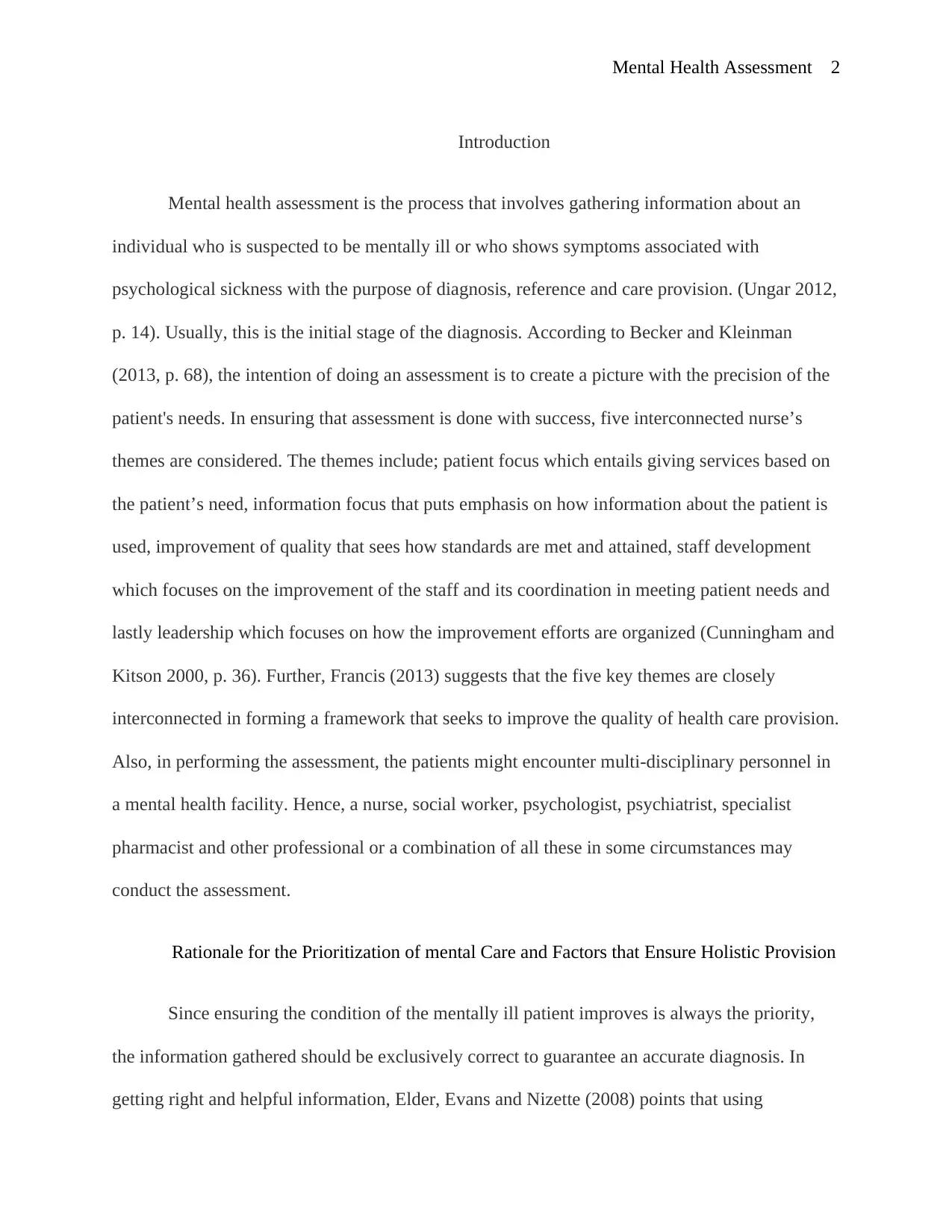
Mental Health Assessment 2
Introduction
Mental health assessment is the process that involves gathering information about an
individual who is suspected to be mentally ill or who shows symptoms associated with
psychological sickness with the purpose of diagnosis, reference and care provision. (Ungar 2012,
p. 14). Usually, this is the initial stage of the diagnosis. According to Becker and Kleinman
(2013, p. 68), the intention of doing an assessment is to create a picture with the precision of the
patient's needs. In ensuring that assessment is done with success, five interconnected nurse’s
themes are considered. The themes include; patient focus which entails giving services based on
the patient’s need, information focus that puts emphasis on how information about the patient is
used, improvement of quality that sees how standards are met and attained, staff development
which focuses on the improvement of the staff and its coordination in meeting patient needs and
lastly leadership which focuses on how the improvement efforts are organized (Cunningham and
Kitson 2000, p. 36). Further, Francis (2013) suggests that the five key themes are closely
interconnected in forming a framework that seeks to improve the quality of health care provision.
Also, in performing the assessment, the patients might encounter multi-disciplinary personnel in
a mental health facility. Hence, a nurse, social worker, psychologist, psychiatrist, specialist
pharmacist and other professional or a combination of all these in some circumstances may
conduct the assessment.
Rationale for the Prioritization of mental Care and Factors that Ensure Holistic Provision
Since ensuring the condition of the mentally ill patient improves is always the priority,
the information gathered should be exclusively correct to guarantee an accurate diagnosis. In
getting right and helpful information, Elder, Evans and Nizette (2008) points that using
Introduction
Mental health assessment is the process that involves gathering information about an
individual who is suspected to be mentally ill or who shows symptoms associated with
psychological sickness with the purpose of diagnosis, reference and care provision. (Ungar 2012,
p. 14). Usually, this is the initial stage of the diagnosis. According to Becker and Kleinman
(2013, p. 68), the intention of doing an assessment is to create a picture with the precision of the
patient's needs. In ensuring that assessment is done with success, five interconnected nurse’s
themes are considered. The themes include; patient focus which entails giving services based on
the patient’s need, information focus that puts emphasis on how information about the patient is
used, improvement of quality that sees how standards are met and attained, staff development
which focuses on the improvement of the staff and its coordination in meeting patient needs and
lastly leadership which focuses on how the improvement efforts are organized (Cunningham and
Kitson 2000, p. 36). Further, Francis (2013) suggests that the five key themes are closely
interconnected in forming a framework that seeks to improve the quality of health care provision.
Also, in performing the assessment, the patients might encounter multi-disciplinary personnel in
a mental health facility. Hence, a nurse, social worker, psychologist, psychiatrist, specialist
pharmacist and other professional or a combination of all these in some circumstances may
conduct the assessment.
Rationale for the Prioritization of mental Care and Factors that Ensure Holistic Provision
Since ensuring the condition of the mentally ill patient improves is always the priority,
the information gathered should be exclusively correct to guarantee an accurate diagnosis. In
getting right and helpful information, Elder, Evans and Nizette (2008) points that using
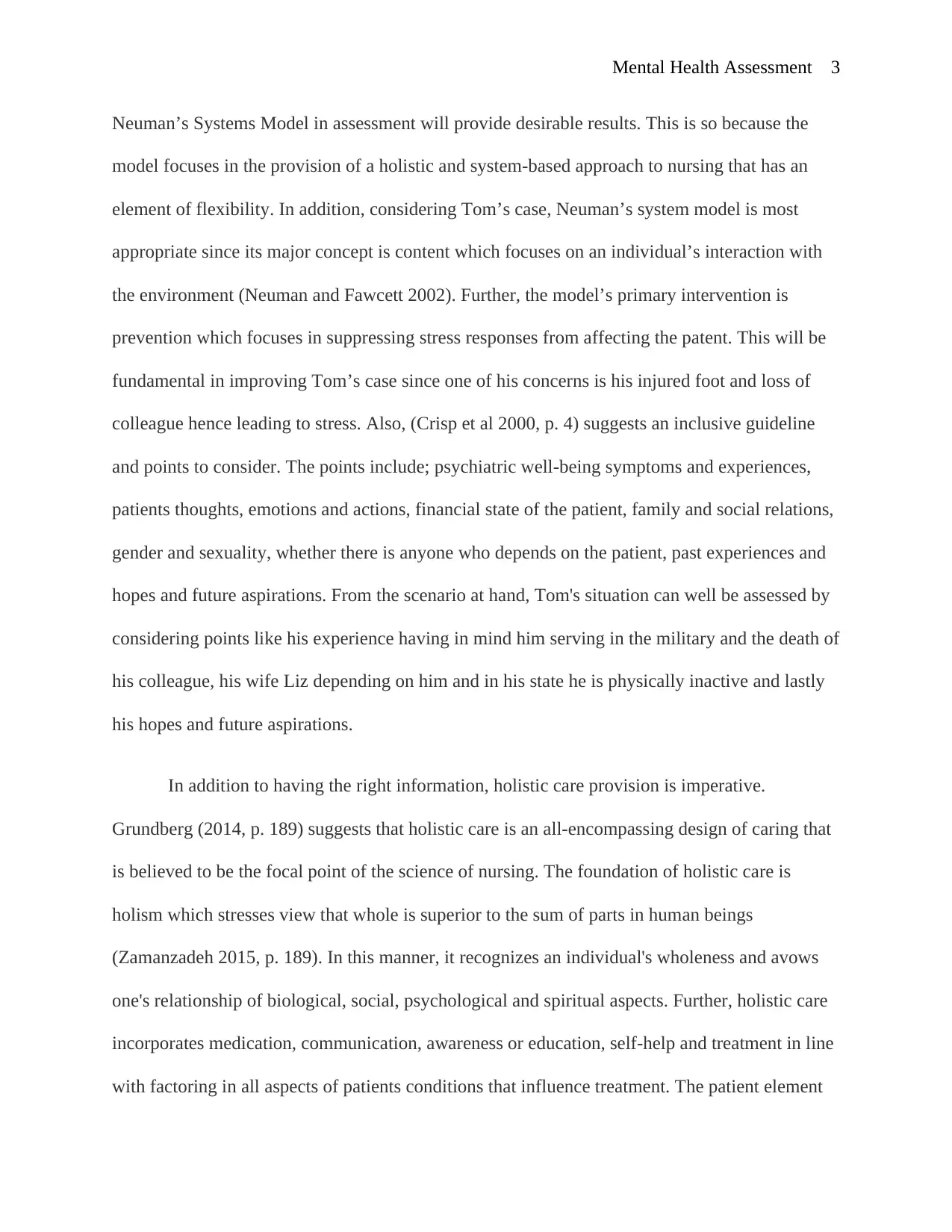
Mental Health Assessment 3
Neuman’s Systems Model in assessment will provide desirable results. This is so because the
model focuses in the provision of a holistic and system-based approach to nursing that has an
element of flexibility. In addition, considering Tom’s case, Neuman’s system model is most
appropriate since its major concept is content which focuses on an individual’s interaction with
the environment (Neuman and Fawcett 2002). Further, the model’s primary intervention is
prevention which focuses in suppressing stress responses from affecting the patent. This will be
fundamental in improving Tom’s case since one of his concerns is his injured foot and loss of
colleague hence leading to stress. Also, (Crisp et al 2000, p. 4) suggests an inclusive guideline
and points to consider. The points include; psychiatric well-being symptoms and experiences,
patients thoughts, emotions and actions, financial state of the patient, family and social relations,
gender and sexuality, whether there is anyone who depends on the patient, past experiences and
hopes and future aspirations. From the scenario at hand, Tom's situation can well be assessed by
considering points like his experience having in mind him serving in the military and the death of
his colleague, his wife Liz depending on him and in his state he is physically inactive and lastly
his hopes and future aspirations.
In addition to having the right information, holistic care provision is imperative.
Grundberg (2014, p. 189) suggests that holistic care is an all-encompassing design of caring that
is believed to be the focal point of the science of nursing. The foundation of holistic care is
holism which stresses view that whole is superior to the sum of parts in human beings
(Zamanzadeh 2015, p. 189). In this manner, it recognizes an individual's wholeness and avows
one's relationship of biological, social, psychological and spiritual aspects. Further, holistic care
incorporates medication, communication, awareness or education, self-help and treatment in line
with factoring in all aspects of patients conditions that influence treatment. The patient element
Neuman’s Systems Model in assessment will provide desirable results. This is so because the
model focuses in the provision of a holistic and system-based approach to nursing that has an
element of flexibility. In addition, considering Tom’s case, Neuman’s system model is most
appropriate since its major concept is content which focuses on an individual’s interaction with
the environment (Neuman and Fawcett 2002). Further, the model’s primary intervention is
prevention which focuses in suppressing stress responses from affecting the patent. This will be
fundamental in improving Tom’s case since one of his concerns is his injured foot and loss of
colleague hence leading to stress. Also, (Crisp et al 2000, p. 4) suggests an inclusive guideline
and points to consider. The points include; psychiatric well-being symptoms and experiences,
patients thoughts, emotions and actions, financial state of the patient, family and social relations,
gender and sexuality, whether there is anyone who depends on the patient, past experiences and
hopes and future aspirations. From the scenario at hand, Tom's situation can well be assessed by
considering points like his experience having in mind him serving in the military and the death of
his colleague, his wife Liz depending on him and in his state he is physically inactive and lastly
his hopes and future aspirations.
In addition to having the right information, holistic care provision is imperative.
Grundberg (2014, p. 189) suggests that holistic care is an all-encompassing design of caring that
is believed to be the focal point of the science of nursing. The foundation of holistic care is
holism which stresses view that whole is superior to the sum of parts in human beings
(Zamanzadeh 2015, p. 189). In this manner, it recognizes an individual's wholeness and avows
one's relationship of biological, social, psychological and spiritual aspects. Further, holistic care
incorporates medication, communication, awareness or education, self-help and treatment in line
with factoring in all aspects of patients conditions that influence treatment. The patient element
⊘ This is a preview!⊘
Do you want full access?
Subscribe today to unlock all pages.

Trusted by 1+ million students worldwide
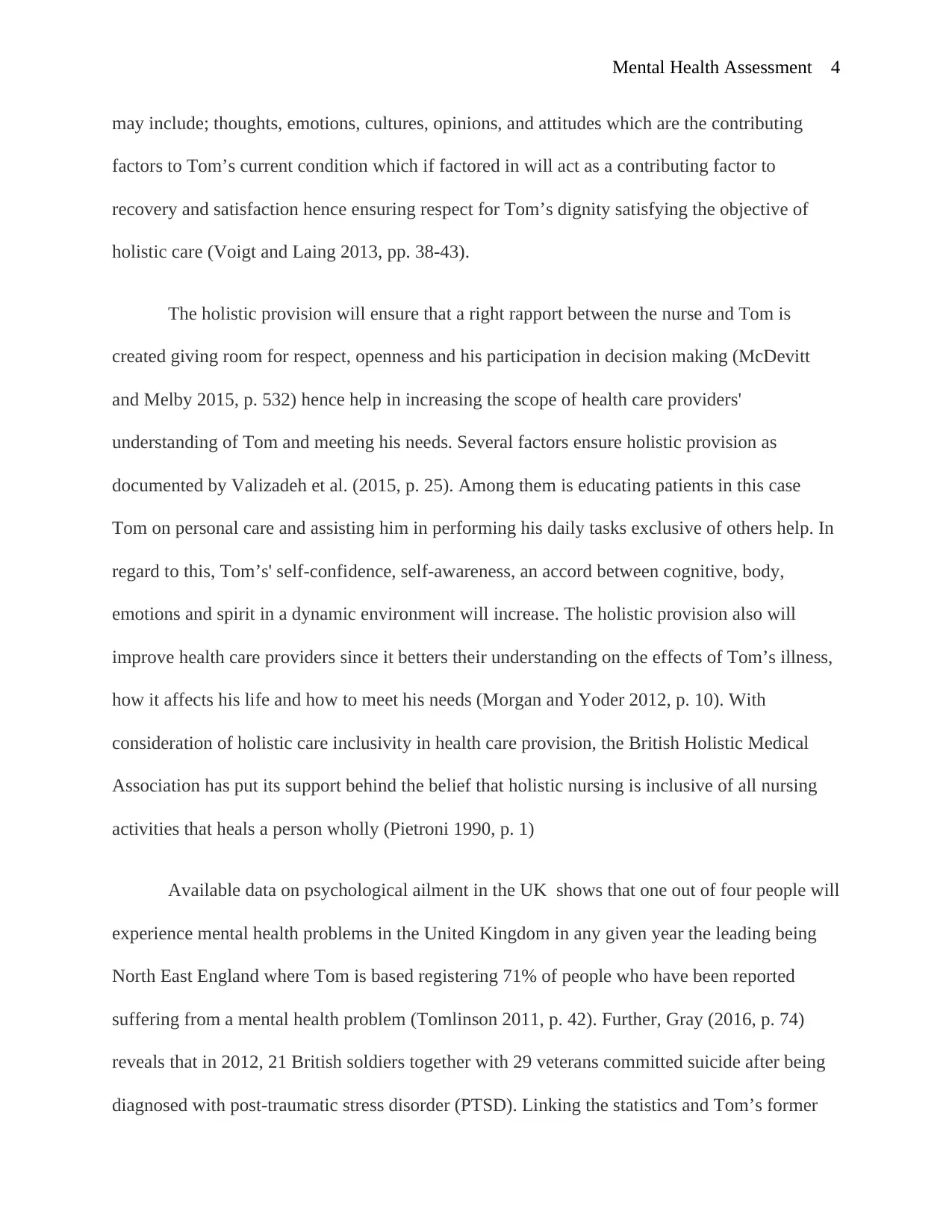
Mental Health Assessment 4
may include; thoughts, emotions, cultures, opinions, and attitudes which are the contributing
factors to Tom’s current condition which if factored in will act as a contributing factor to
recovery and satisfaction hence ensuring respect for Tom’s dignity satisfying the objective of
holistic care (Voigt and Laing 2013, pp. 38-43).
The holistic provision will ensure that a right rapport between the nurse and Tom is
created giving room for respect, openness and his participation in decision making (McDevitt
and Melby 2015, p. 532) hence help in increasing the scope of health care providers'
understanding of Tom and meeting his needs. Several factors ensure holistic provision as
documented by Valizadeh et al. (2015, p. 25). Among them is educating patients in this case
Tom on personal care and assisting him in performing his daily tasks exclusive of others help. In
regard to this, Tom’s' self-confidence, self-awareness, an accord between cognitive, body,
emotions and spirit in a dynamic environment will increase. The holistic provision also will
improve health care providers since it betters their understanding on the effects of Tom’s illness,
how it affects his life and how to meet his needs (Morgan and Yoder 2012, p. 10). With
consideration of holistic care inclusivity in health care provision, the British Holistic Medical
Association has put its support behind the belief that holistic nursing is inclusive of all nursing
activities that heals a person wholly (Pietroni 1990, p. 1)
Available data on psychological ailment in the UK shows that one out of four people will
experience mental health problems in the United Kingdom in any given year the leading being
North East England where Tom is based registering 71% of people who have been reported
suffering from a mental health problem (Tomlinson 2011, p. 42). Further, Gray (2016, p. 74)
reveals that in 2012, 21 British soldiers together with 29 veterans committed suicide after being
diagnosed with post-traumatic stress disorder (PTSD). Linking the statistics and Tom’s former
may include; thoughts, emotions, cultures, opinions, and attitudes which are the contributing
factors to Tom’s current condition which if factored in will act as a contributing factor to
recovery and satisfaction hence ensuring respect for Tom’s dignity satisfying the objective of
holistic care (Voigt and Laing 2013, pp. 38-43).
The holistic provision will ensure that a right rapport between the nurse and Tom is
created giving room for respect, openness and his participation in decision making (McDevitt
and Melby 2015, p. 532) hence help in increasing the scope of health care providers'
understanding of Tom and meeting his needs. Several factors ensure holistic provision as
documented by Valizadeh et al. (2015, p. 25). Among them is educating patients in this case
Tom on personal care and assisting him in performing his daily tasks exclusive of others help. In
regard to this, Tom’s' self-confidence, self-awareness, an accord between cognitive, body,
emotions and spirit in a dynamic environment will increase. The holistic provision also will
improve health care providers since it betters their understanding on the effects of Tom’s illness,
how it affects his life and how to meet his needs (Morgan and Yoder 2012, p. 10). With
consideration of holistic care inclusivity in health care provision, the British Holistic Medical
Association has put its support behind the belief that holistic nursing is inclusive of all nursing
activities that heals a person wholly (Pietroni 1990, p. 1)
Available data on psychological ailment in the UK shows that one out of four people will
experience mental health problems in the United Kingdom in any given year the leading being
North East England where Tom is based registering 71% of people who have been reported
suffering from a mental health problem (Tomlinson 2011, p. 42). Further, Gray (2016, p. 74)
reveals that in 2012, 21 British soldiers together with 29 veterans committed suicide after being
diagnosed with post-traumatic stress disorder (PTSD). Linking the statistics and Tom’s former
Paraphrase This Document
Need a fresh take? Get an instant paraphrase of this document with our AI Paraphraser
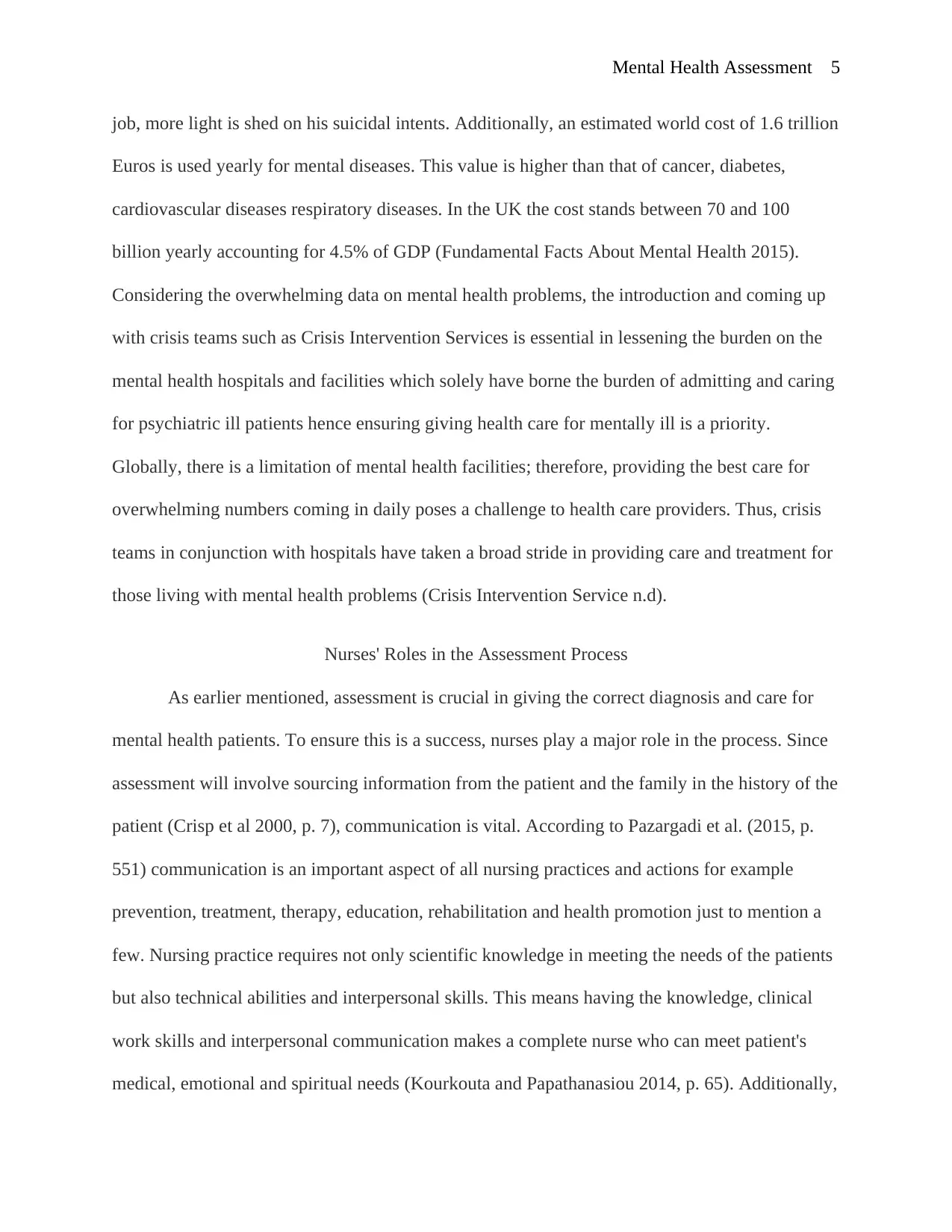
Mental Health Assessment 5
job, more light is shed on his suicidal intents. Additionally, an estimated world cost of 1.6 trillion
Euros is used yearly for mental diseases. This value is higher than that of cancer, diabetes,
cardiovascular diseases respiratory diseases. In the UK the cost stands between 70 and 100
billion yearly accounting for 4.5% of GDP (Fundamental Facts About Mental Health 2015).
Considering the overwhelming data on mental health problems, the introduction and coming up
with crisis teams such as Crisis Intervention Services is essential in lessening the burden on the
mental health hospitals and facilities which solely have borne the burden of admitting and caring
for psychiatric ill patients hence ensuring giving health care for mentally ill is a priority.
Globally, there is a limitation of mental health facilities; therefore, providing the best care for
overwhelming numbers coming in daily poses a challenge to health care providers. Thus, crisis
teams in conjunction with hospitals have taken a broad stride in providing care and treatment for
those living with mental health problems (Crisis Intervention Service n.d).
Nurses' Roles in the Assessment Process
As earlier mentioned, assessment is crucial in giving the correct diagnosis and care for
mental health patients. To ensure this is a success, nurses play a major role in the process. Since
assessment will involve sourcing information from the patient and the family in the history of the
patient (Crisp et al 2000, p. 7), communication is vital. According to Pazargadi et al. (2015, p.
551) communication is an important aspect of all nursing practices and actions for example
prevention, treatment, therapy, education, rehabilitation and health promotion just to mention a
few. Nursing practice requires not only scientific knowledge in meeting the needs of the patients
but also technical abilities and interpersonal skills. This means having the knowledge, clinical
work skills and interpersonal communication makes a complete nurse who can meet patient's
medical, emotional and spiritual needs (Kourkouta and Papathanasiou 2014, p. 65). Additionally,
job, more light is shed on his suicidal intents. Additionally, an estimated world cost of 1.6 trillion
Euros is used yearly for mental diseases. This value is higher than that of cancer, diabetes,
cardiovascular diseases respiratory diseases. In the UK the cost stands between 70 and 100
billion yearly accounting for 4.5% of GDP (Fundamental Facts About Mental Health 2015).
Considering the overwhelming data on mental health problems, the introduction and coming up
with crisis teams such as Crisis Intervention Services is essential in lessening the burden on the
mental health hospitals and facilities which solely have borne the burden of admitting and caring
for psychiatric ill patients hence ensuring giving health care for mentally ill is a priority.
Globally, there is a limitation of mental health facilities; therefore, providing the best care for
overwhelming numbers coming in daily poses a challenge to health care providers. Thus, crisis
teams in conjunction with hospitals have taken a broad stride in providing care and treatment for
those living with mental health problems (Crisis Intervention Service n.d).
Nurses' Roles in the Assessment Process
As earlier mentioned, assessment is crucial in giving the correct diagnosis and care for
mental health patients. To ensure this is a success, nurses play a major role in the process. Since
assessment will involve sourcing information from the patient and the family in the history of the
patient (Crisp et al 2000, p. 7), communication is vital. According to Pazargadi et al. (2015, p.
551) communication is an important aspect of all nursing practices and actions for example
prevention, treatment, therapy, education, rehabilitation and health promotion just to mention a
few. Nursing practice requires not only scientific knowledge in meeting the needs of the patients
but also technical abilities and interpersonal skills. This means having the knowledge, clinical
work skills and interpersonal communication makes a complete nurse who can meet patient's
medical, emotional and spiritual needs (Kourkouta and Papathanasiou 2014, p. 65). Additionally,
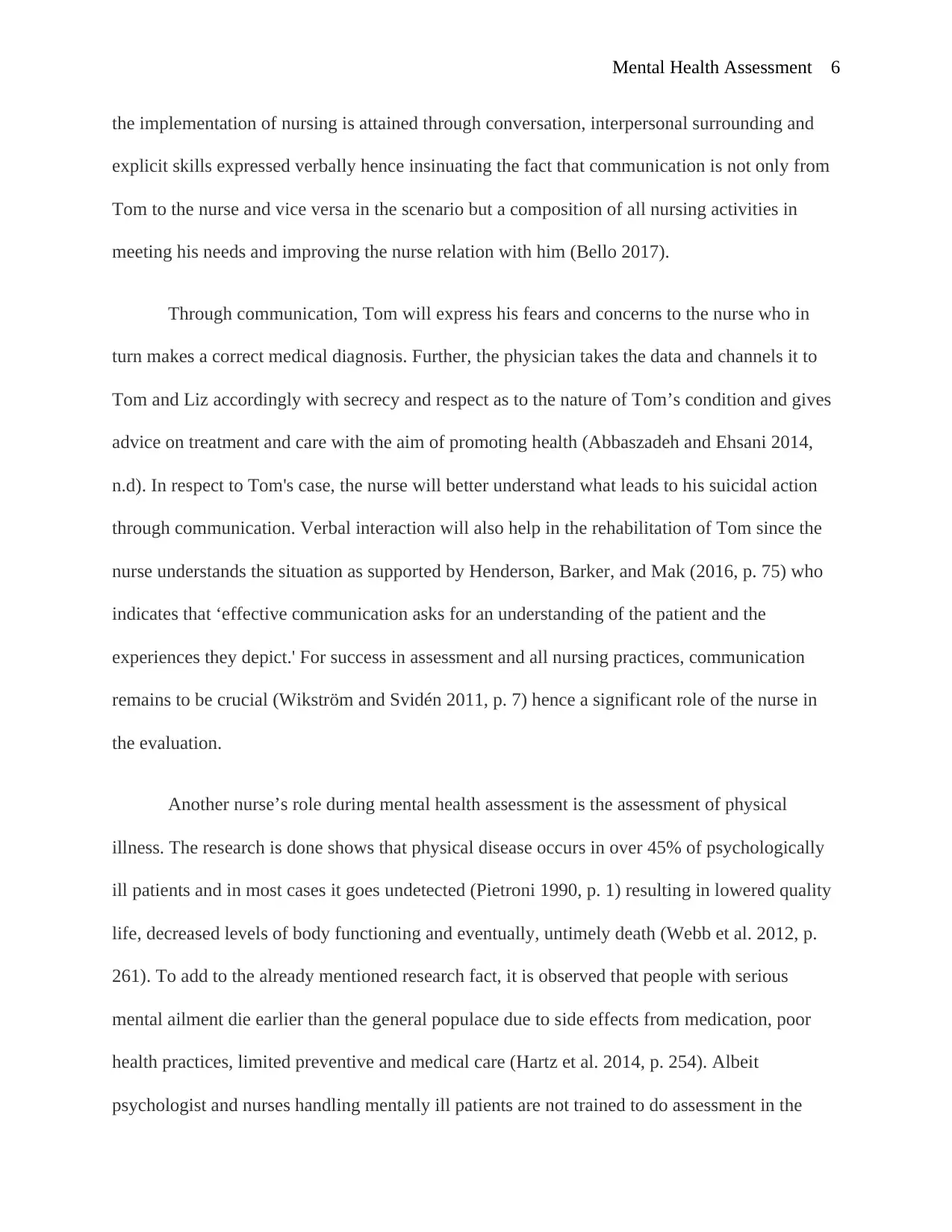
Mental Health Assessment 6
the implementation of nursing is attained through conversation, interpersonal surrounding and
explicit skills expressed verbally hence insinuating the fact that communication is not only from
Tom to the nurse and vice versa in the scenario but a composition of all nursing activities in
meeting his needs and improving the nurse relation with him (Bello 2017).
Through communication, Tom will express his fears and concerns to the nurse who in
turn makes a correct medical diagnosis. Further, the physician takes the data and channels it to
Tom and Liz accordingly with secrecy and respect as to the nature of Tom’s condition and gives
advice on treatment and care with the aim of promoting health (Abbaszadeh and Ehsani 2014,
n.d). In respect to Tom's case, the nurse will better understand what leads to his suicidal action
through communication. Verbal interaction will also help in the rehabilitation of Tom since the
nurse understands the situation as supported by Henderson, Barker, and Mak (2016, p. 75) who
indicates that ‘effective communication asks for an understanding of the patient and the
experiences they depict.' For success in assessment and all nursing practices, communication
remains to be crucial (Wikström and Svidén 2011, p. 7) hence a significant role of the nurse in
the evaluation.
Another nurse’s role during mental health assessment is the assessment of physical
illness. The research is done shows that physical disease occurs in over 45% of psychologically
ill patients and in most cases it goes undetected (Pietroni 1990, p. 1) resulting in lowered quality
life, decreased levels of body functioning and eventually, untimely death (Webb et al. 2012, p.
261). To add to the already mentioned research fact, it is observed that people with serious
mental ailment die earlier than the general populace due to side effects from medication, poor
health practices, limited preventive and medical care (Hartz et al. 2014, p. 254). Albeit
psychologist and nurses handling mentally ill patients are not trained to do assessment in the
the implementation of nursing is attained through conversation, interpersonal surrounding and
explicit skills expressed verbally hence insinuating the fact that communication is not only from
Tom to the nurse and vice versa in the scenario but a composition of all nursing activities in
meeting his needs and improving the nurse relation with him (Bello 2017).
Through communication, Tom will express his fears and concerns to the nurse who in
turn makes a correct medical diagnosis. Further, the physician takes the data and channels it to
Tom and Liz accordingly with secrecy and respect as to the nature of Tom’s condition and gives
advice on treatment and care with the aim of promoting health (Abbaszadeh and Ehsani 2014,
n.d). In respect to Tom's case, the nurse will better understand what leads to his suicidal action
through communication. Verbal interaction will also help in the rehabilitation of Tom since the
nurse understands the situation as supported by Henderson, Barker, and Mak (2016, p. 75) who
indicates that ‘effective communication asks for an understanding of the patient and the
experiences they depict.' For success in assessment and all nursing practices, communication
remains to be crucial (Wikström and Svidén 2011, p. 7) hence a significant role of the nurse in
the evaluation.
Another nurse’s role during mental health assessment is the assessment of physical
illness. The research is done shows that physical disease occurs in over 45% of psychologically
ill patients and in most cases it goes undetected (Pietroni 1990, p. 1) resulting in lowered quality
life, decreased levels of body functioning and eventually, untimely death (Webb et al. 2012, p.
261). To add to the already mentioned research fact, it is observed that people with serious
mental ailment die earlier than the general populace due to side effects from medication, poor
health practices, limited preventive and medical care (Hartz et al. 2014, p. 254). Albeit
psychologist and nurses handling mentally ill patients are not trained to do assessment in the
⊘ This is a preview!⊘
Do you want full access?
Subscribe today to unlock all pages.

Trusted by 1+ million students worldwide
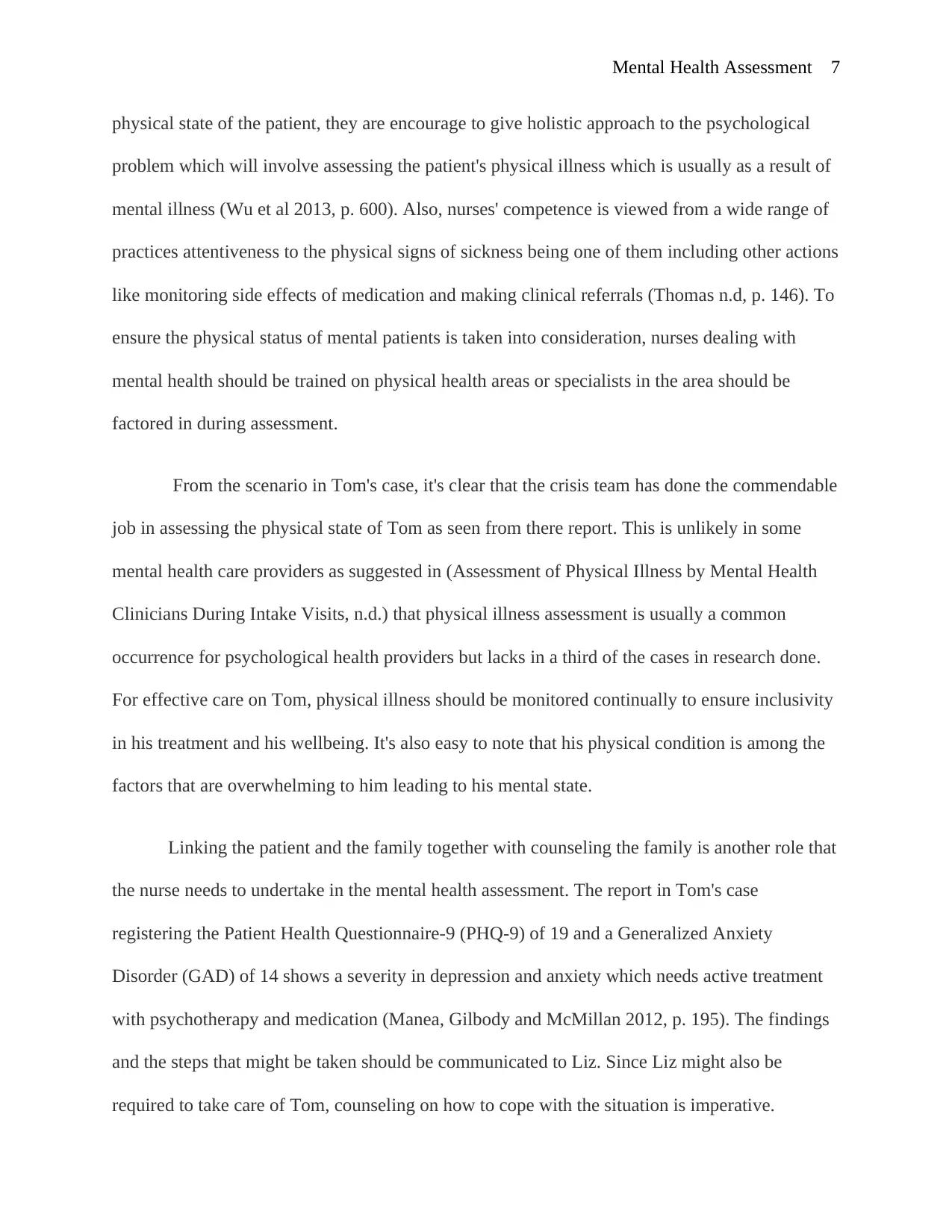
Mental Health Assessment 7
physical state of the patient, they are encourage to give holistic approach to the psychological
problem which will involve assessing the patient's physical illness which is usually as a result of
mental illness (Wu et al 2013, p. 600). Also, nurses' competence is viewed from a wide range of
practices attentiveness to the physical signs of sickness being one of them including other actions
like monitoring side effects of medication and making clinical referrals (Thomas n.d, p. 146). To
ensure the physical status of mental patients is taken into consideration, nurses dealing with
mental health should be trained on physical health areas or specialists in the area should be
factored in during assessment.
From the scenario in Tom's case, it's clear that the crisis team has done the commendable
job in assessing the physical state of Tom as seen from there report. This is unlikely in some
mental health care providers as suggested in (Assessment of Physical Illness by Mental Health
Clinicians During Intake Visits, n.d.) that physical illness assessment is usually a common
occurrence for psychological health providers but lacks in a third of the cases in research done.
For effective care on Tom, physical illness should be monitored continually to ensure inclusivity
in his treatment and his wellbeing. It's also easy to note that his physical condition is among the
factors that are overwhelming to him leading to his mental state.
Linking the patient and the family together with counseling the family is another role that
the nurse needs to undertake in the mental health assessment. The report in Tom's case
registering the Patient Health Questionnaire-9 (PHQ-9) of 19 and a Generalized Anxiety
Disorder (GAD) of 14 shows a severity in depression and anxiety which needs active treatment
with psychotherapy and medication (Manea, Gilbody and McMillan 2012, p. 195). The findings
and the steps that might be taken should be communicated to Liz. Since Liz might also be
required to take care of Tom, counseling on how to cope with the situation is imperative.
physical state of the patient, they are encourage to give holistic approach to the psychological
problem which will involve assessing the patient's physical illness which is usually as a result of
mental illness (Wu et al 2013, p. 600). Also, nurses' competence is viewed from a wide range of
practices attentiveness to the physical signs of sickness being one of them including other actions
like monitoring side effects of medication and making clinical referrals (Thomas n.d, p. 146). To
ensure the physical status of mental patients is taken into consideration, nurses dealing with
mental health should be trained on physical health areas or specialists in the area should be
factored in during assessment.
From the scenario in Tom's case, it's clear that the crisis team has done the commendable
job in assessing the physical state of Tom as seen from there report. This is unlikely in some
mental health care providers as suggested in (Assessment of Physical Illness by Mental Health
Clinicians During Intake Visits, n.d.) that physical illness assessment is usually a common
occurrence for psychological health providers but lacks in a third of the cases in research done.
For effective care on Tom, physical illness should be monitored continually to ensure inclusivity
in his treatment and his wellbeing. It's also easy to note that his physical condition is among the
factors that are overwhelming to him leading to his mental state.
Linking the patient and the family together with counseling the family is another role that
the nurse needs to undertake in the mental health assessment. The report in Tom's case
registering the Patient Health Questionnaire-9 (PHQ-9) of 19 and a Generalized Anxiety
Disorder (GAD) of 14 shows a severity in depression and anxiety which needs active treatment
with psychotherapy and medication (Manea, Gilbody and McMillan 2012, p. 195). The findings
and the steps that might be taken should be communicated to Liz. Since Liz might also be
required to take care of Tom, counseling on how to cope with the situation is imperative.
Paraphrase This Document
Need a fresh take? Get an instant paraphrase of this document with our AI Paraphraser
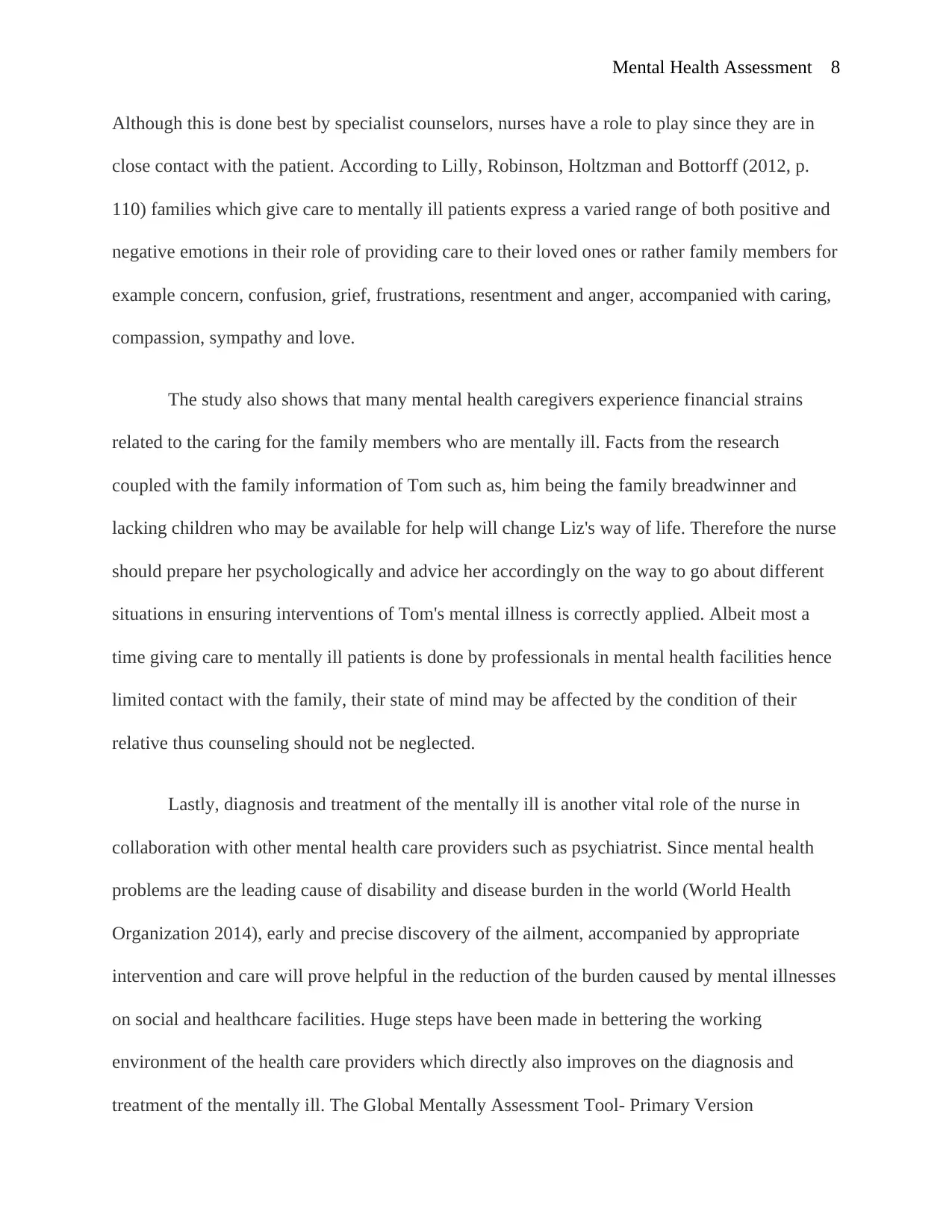
Mental Health Assessment 8
Although this is done best by specialist counselors, nurses have a role to play since they are in
close contact with the patient. According to Lilly, Robinson, Holtzman and Bottorff (2012, p.
110) families which give care to mentally ill patients express a varied range of both positive and
negative emotions in their role of providing care to their loved ones or rather family members for
example concern, confusion, grief, frustrations, resentment and anger, accompanied with caring,
compassion, sympathy and love.
The study also shows that many mental health caregivers experience financial strains
related to the caring for the family members who are mentally ill. Facts from the research
coupled with the family information of Tom such as, him being the family breadwinner and
lacking children who may be available for help will change Liz's way of life. Therefore the nurse
should prepare her psychologically and advice her accordingly on the way to go about different
situations in ensuring interventions of Tom's mental illness is correctly applied. Albeit most a
time giving care to mentally ill patients is done by professionals in mental health facilities hence
limited contact with the family, their state of mind may be affected by the condition of their
relative thus counseling should not be neglected.
Lastly, diagnosis and treatment of the mentally ill is another vital role of the nurse in
collaboration with other mental health care providers such as psychiatrist. Since mental health
problems are the leading cause of disability and disease burden in the world (World Health
Organization 2014), early and precise discovery of the ailment, accompanied by appropriate
intervention and care will prove helpful in the reduction of the burden caused by mental illnesses
on social and healthcare facilities. Huge steps have been made in bettering the working
environment of the health care providers which directly also improves on the diagnosis and
treatment of the mentally ill. The Global Mentally Assessment Tool- Primary Version
Although this is done best by specialist counselors, nurses have a role to play since they are in
close contact with the patient. According to Lilly, Robinson, Holtzman and Bottorff (2012, p.
110) families which give care to mentally ill patients express a varied range of both positive and
negative emotions in their role of providing care to their loved ones or rather family members for
example concern, confusion, grief, frustrations, resentment and anger, accompanied with caring,
compassion, sympathy and love.
The study also shows that many mental health caregivers experience financial strains
related to the caring for the family members who are mentally ill. Facts from the research
coupled with the family information of Tom such as, him being the family breadwinner and
lacking children who may be available for help will change Liz's way of life. Therefore the nurse
should prepare her psychologically and advice her accordingly on the way to go about different
situations in ensuring interventions of Tom's mental illness is correctly applied. Albeit most a
time giving care to mentally ill patients is done by professionals in mental health facilities hence
limited contact with the family, their state of mind may be affected by the condition of their
relative thus counseling should not be neglected.
Lastly, diagnosis and treatment of the mentally ill is another vital role of the nurse in
collaboration with other mental health care providers such as psychiatrist. Since mental health
problems are the leading cause of disability and disease burden in the world (World Health
Organization 2014), early and precise discovery of the ailment, accompanied by appropriate
intervention and care will prove helpful in the reduction of the burden caused by mental illnesses
on social and healthcare facilities. Huge steps have been made in bettering the working
environment of the health care providers which directly also improves on the diagnosis and
treatment of the mentally ill. The Global Mentally Assessment Tool- Primary Version
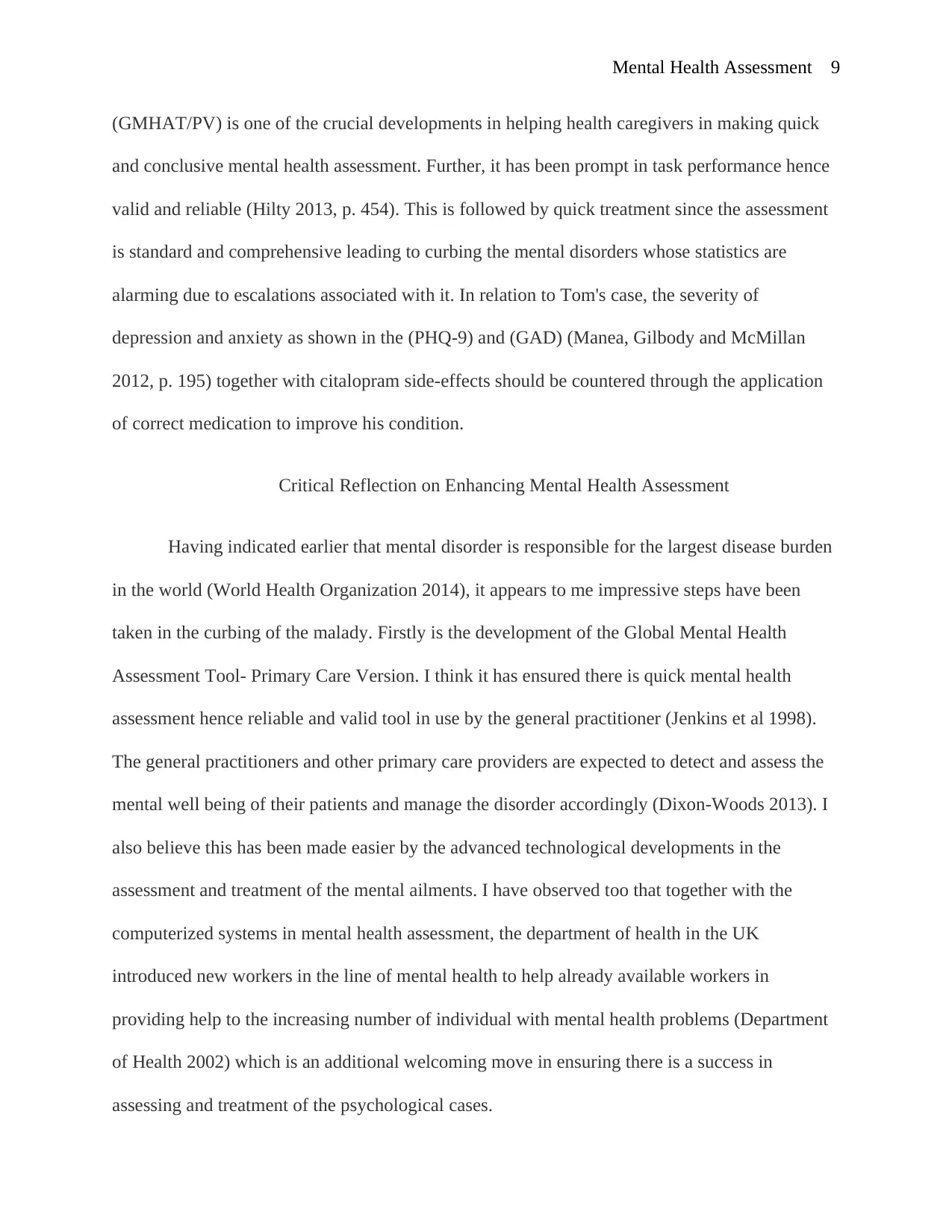
Mental Health Assessment 9
(GMHAT/PV) is one of the crucial developments in helping health caregivers in making quick
and conclusive mental health assessment. Further, it has been prompt in task performance hence
valid and reliable (Hilty 2013, p. 454). This is followed by quick treatment since the assessment
is standard and comprehensive leading to curbing the mental disorders whose statistics are
alarming due to escalations associated with it. In relation to Tom's case, the severity of
depression and anxiety as shown in the (PHQ-9) and (GAD) (Manea, Gilbody and McMillan
2012, p. 195) together with citalopram side-effects should be countered through the application
of correct medication to improve his condition.
Critical Reflection on Enhancing Mental Health Assessment
Having indicated earlier that mental disorder is responsible for the largest disease burden
in the world (World Health Organization 2014), it appears to me impressive steps have been
taken in the curbing of the malady. Firstly is the development of the Global Mental Health
Assessment Tool- Primary Care Version. I think it has ensured there is quick mental health
assessment hence reliable and valid tool in use by the general practitioner (Jenkins et al 1998).
The general practitioners and other primary care providers are expected to detect and assess the
mental well being of their patients and manage the disorder accordingly (Dixon-Woods 2013). I
also believe this has been made easier by the advanced technological developments in the
assessment and treatment of the mental ailments. I have observed too that together with the
computerized systems in mental health assessment, the department of health in the UK
introduced new workers in the line of mental health to help already available workers in
providing help to the increasing number of individual with mental health problems (Department
of Health 2002) which is an additional welcoming move in ensuring there is a success in
assessing and treatment of the psychological cases.
(GMHAT/PV) is one of the crucial developments in helping health caregivers in making quick
and conclusive mental health assessment. Further, it has been prompt in task performance hence
valid and reliable (Hilty 2013, p. 454). This is followed by quick treatment since the assessment
is standard and comprehensive leading to curbing the mental disorders whose statistics are
alarming due to escalations associated with it. In relation to Tom's case, the severity of
depression and anxiety as shown in the (PHQ-9) and (GAD) (Manea, Gilbody and McMillan
2012, p. 195) together with citalopram side-effects should be countered through the application
of correct medication to improve his condition.
Critical Reflection on Enhancing Mental Health Assessment
Having indicated earlier that mental disorder is responsible for the largest disease burden
in the world (World Health Organization 2014), it appears to me impressive steps have been
taken in the curbing of the malady. Firstly is the development of the Global Mental Health
Assessment Tool- Primary Care Version. I think it has ensured there is quick mental health
assessment hence reliable and valid tool in use by the general practitioner (Jenkins et al 1998).
The general practitioners and other primary care providers are expected to detect and assess the
mental well being of their patients and manage the disorder accordingly (Dixon-Woods 2013). I
also believe this has been made easier by the advanced technological developments in the
assessment and treatment of the mental ailments. I have observed too that together with the
computerized systems in mental health assessment, the department of health in the UK
introduced new workers in the line of mental health to help already available workers in
providing help to the increasing number of individual with mental health problems (Department
of Health 2002) which is an additional welcoming move in ensuring there is a success in
assessing and treatment of the psychological cases.
⊘ This is a preview!⊘
Do you want full access?
Subscribe today to unlock all pages.

Trusted by 1+ million students worldwide
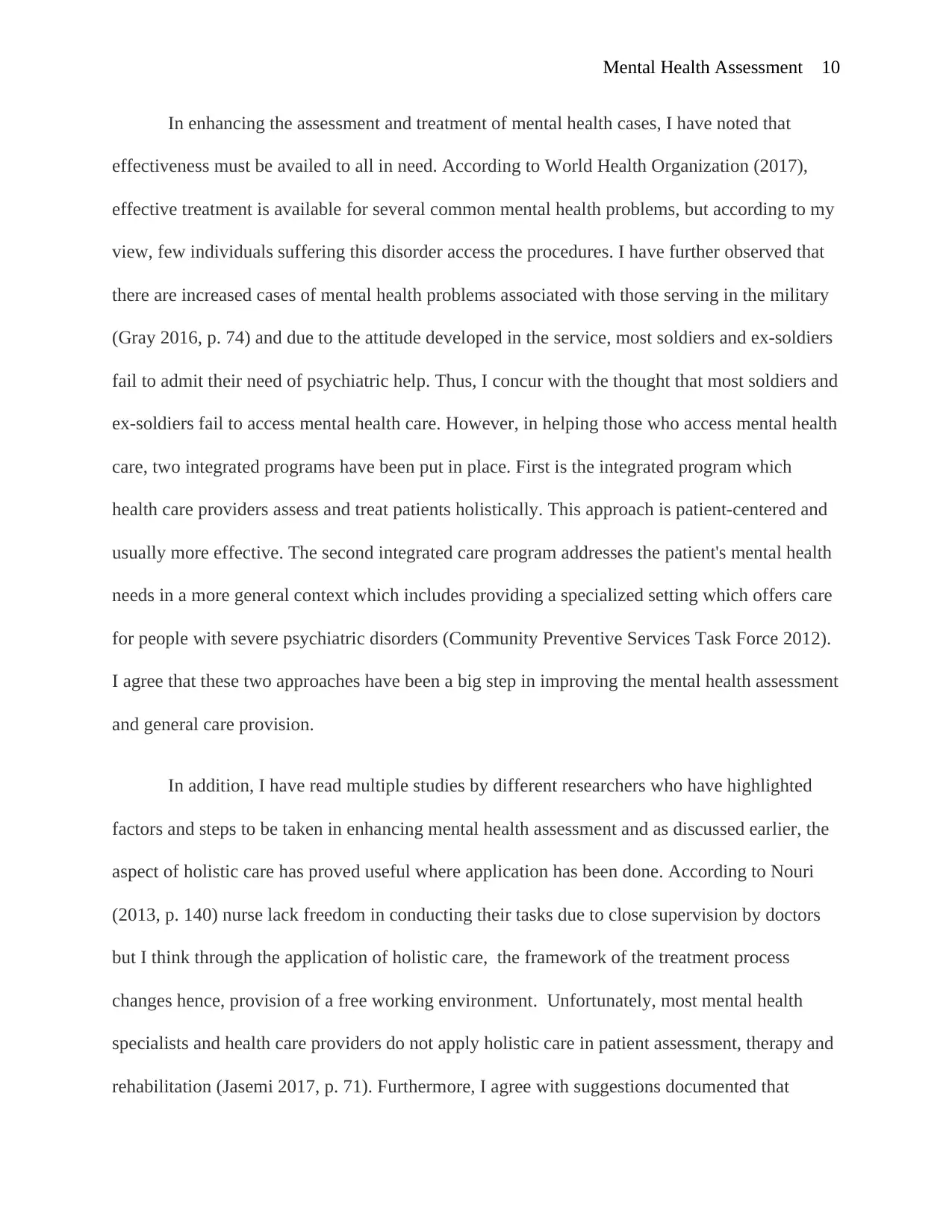
Mental Health Assessment 10
In enhancing the assessment and treatment of mental health cases, I have noted that
effectiveness must be availed to all in need. According to World Health Organization (2017),
effective treatment is available for several common mental health problems, but according to my
view, few individuals suffering this disorder access the procedures. I have further observed that
there are increased cases of mental health problems associated with those serving in the military
(Gray 2016, p. 74) and due to the attitude developed in the service, most soldiers and ex-soldiers
fail to admit their need of psychiatric help. Thus, I concur with the thought that most soldiers and
ex-soldiers fail to access mental health care. However, in helping those who access mental health
care, two integrated programs have been put in place. First is the integrated program which
health care providers assess and treat patients holistically. This approach is patient-centered and
usually more effective. The second integrated care program addresses the patient's mental health
needs in a more general context which includes providing a specialized setting which offers care
for people with severe psychiatric disorders (Community Preventive Services Task Force 2012).
I agree that these two approaches have been a big step in improving the mental health assessment
and general care provision.
In addition, I have read multiple studies by different researchers who have highlighted
factors and steps to be taken in enhancing mental health assessment and as discussed earlier, the
aspect of holistic care has proved useful where application has been done. According to Nouri
(2013, p. 140) nurse lack freedom in conducting their tasks due to close supervision by doctors
but I think through the application of holistic care, the framework of the treatment process
changes hence, provision of a free working environment. Unfortunately, most mental health
specialists and health care providers do not apply holistic care in patient assessment, therapy and
rehabilitation (Jasemi 2017, p. 71). Furthermore, I agree with suggestions documented that
In enhancing the assessment and treatment of mental health cases, I have noted that
effectiveness must be availed to all in need. According to World Health Organization (2017),
effective treatment is available for several common mental health problems, but according to my
view, few individuals suffering this disorder access the procedures. I have further observed that
there are increased cases of mental health problems associated with those serving in the military
(Gray 2016, p. 74) and due to the attitude developed in the service, most soldiers and ex-soldiers
fail to admit their need of psychiatric help. Thus, I concur with the thought that most soldiers and
ex-soldiers fail to access mental health care. However, in helping those who access mental health
care, two integrated programs have been put in place. First is the integrated program which
health care providers assess and treat patients holistically. This approach is patient-centered and
usually more effective. The second integrated care program addresses the patient's mental health
needs in a more general context which includes providing a specialized setting which offers care
for people with severe psychiatric disorders (Community Preventive Services Task Force 2012).
I agree that these two approaches have been a big step in improving the mental health assessment
and general care provision.
In addition, I have read multiple studies by different researchers who have highlighted
factors and steps to be taken in enhancing mental health assessment and as discussed earlier, the
aspect of holistic care has proved useful where application has been done. According to Nouri
(2013, p. 140) nurse lack freedom in conducting their tasks due to close supervision by doctors
but I think through the application of holistic care, the framework of the treatment process
changes hence, provision of a free working environment. Unfortunately, most mental health
specialists and health care providers do not apply holistic care in patient assessment, therapy and
rehabilitation (Jasemi 2017, p. 71). Furthermore, I agree with suggestions documented that
Paraphrase This Document
Need a fresh take? Get an instant paraphrase of this document with our AI Paraphraser
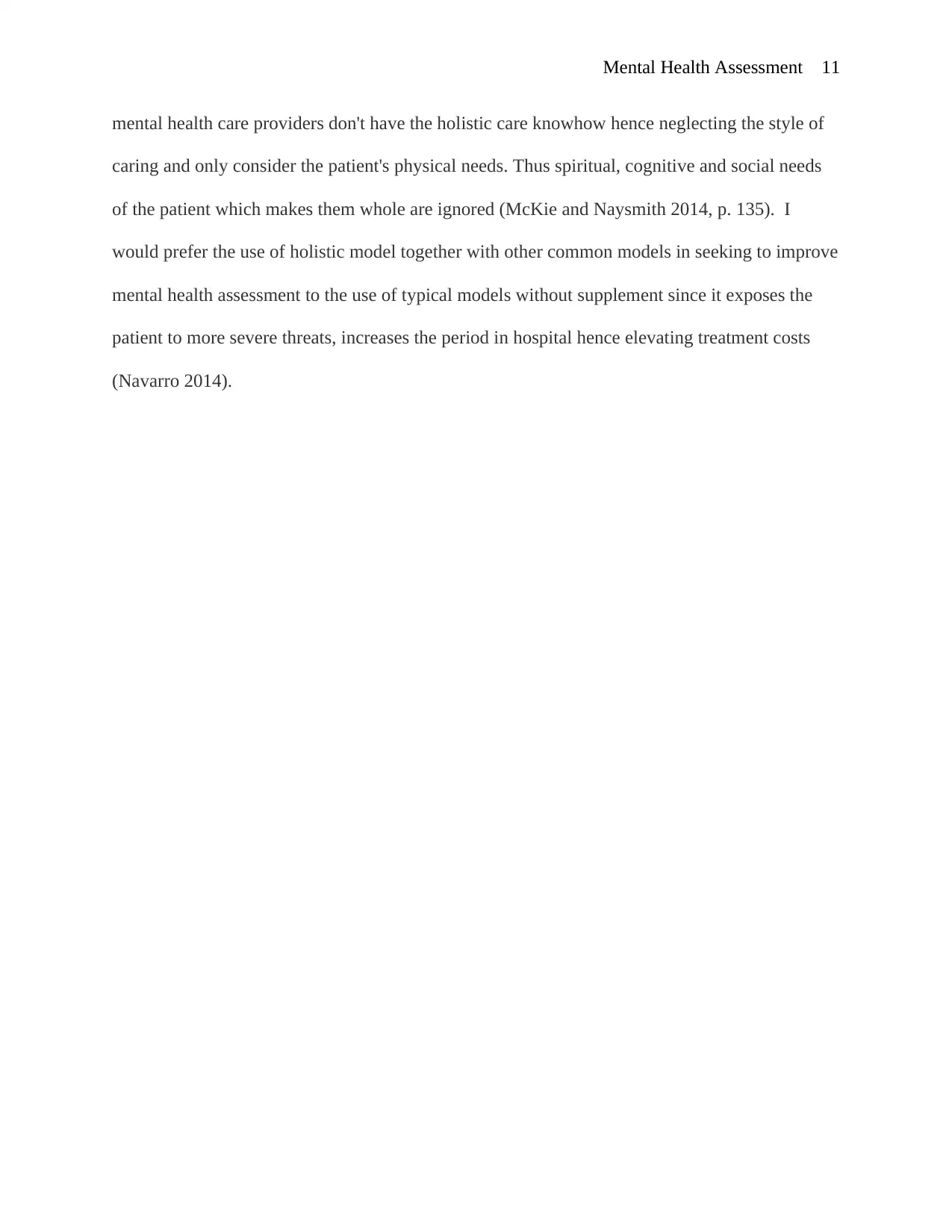
Mental Health Assessment 11
mental health care providers don't have the holistic care knowhow hence neglecting the style of
caring and only consider the patient's physical needs. Thus spiritual, cognitive and social needs
of the patient which makes them whole are ignored (McKie and Naysmith 2014, p. 135). I
would prefer the use of holistic model together with other common models in seeking to improve
mental health assessment to the use of typical models without supplement since it exposes the
patient to more severe threats, increases the period in hospital hence elevating treatment costs
(Navarro 2014).
mental health care providers don't have the holistic care knowhow hence neglecting the style of
caring and only consider the patient's physical needs. Thus spiritual, cognitive and social needs
of the patient which makes them whole are ignored (McKie and Naysmith 2014, p. 135). I
would prefer the use of holistic model together with other common models in seeking to improve
mental health assessment to the use of typical models without supplement since it exposes the
patient to more severe threats, increases the period in hospital hence elevating treatment costs
(Navarro 2014).
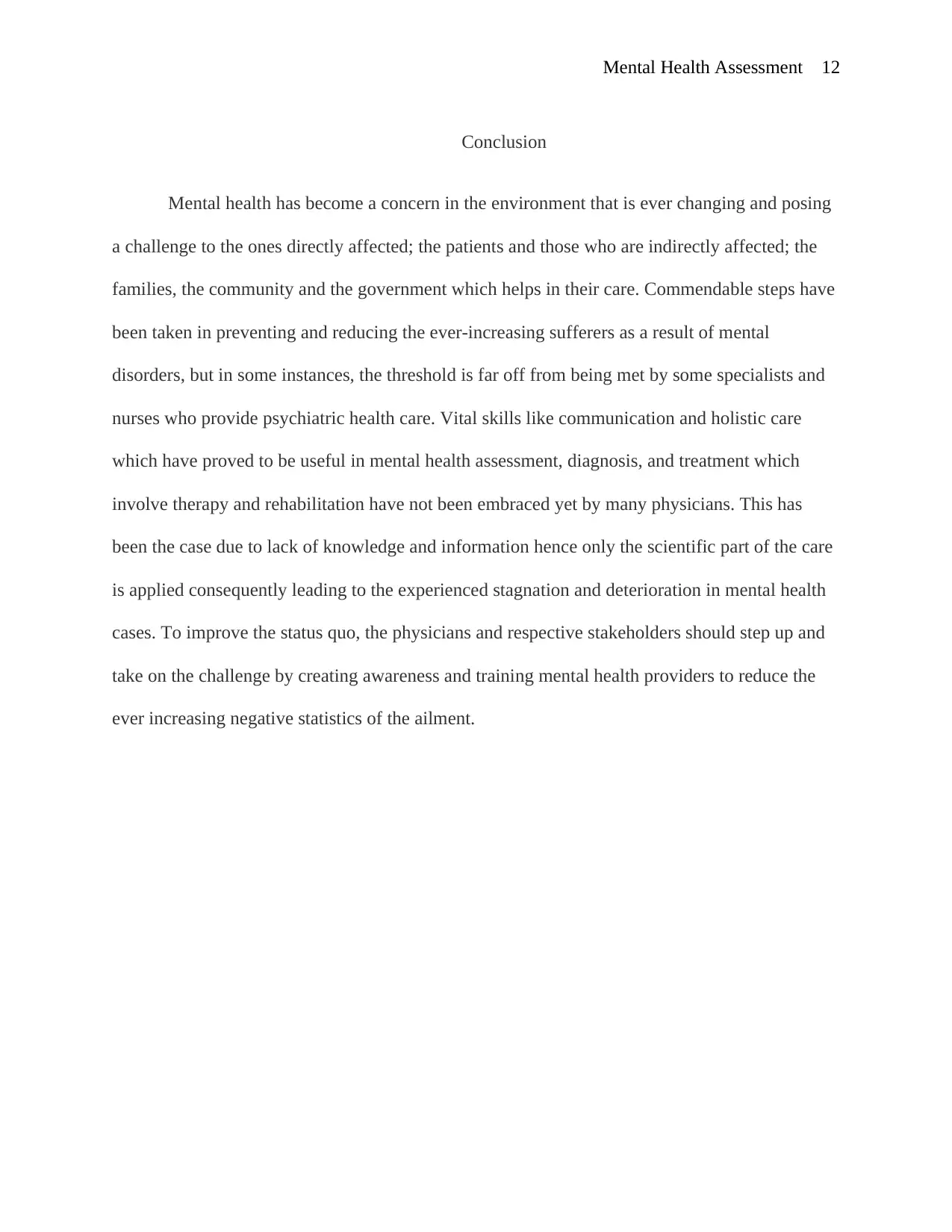
Mental Health Assessment 12
Conclusion
Mental health has become a concern in the environment that is ever changing and posing
a challenge to the ones directly affected; the patients and those who are indirectly affected; the
families, the community and the government which helps in their care. Commendable steps have
been taken in preventing and reducing the ever-increasing sufferers as a result of mental
disorders, but in some instances, the threshold is far off from being met by some specialists and
nurses who provide psychiatric health care. Vital skills like communication and holistic care
which have proved to be useful in mental health assessment, diagnosis, and treatment which
involve therapy and rehabilitation have not been embraced yet by many physicians. This has
been the case due to lack of knowledge and information hence only the scientific part of the care
is applied consequently leading to the experienced stagnation and deterioration in mental health
cases. To improve the status quo, the physicians and respective stakeholders should step up and
take on the challenge by creating awareness and training mental health providers to reduce the
ever increasing negative statistics of the ailment.
Conclusion
Mental health has become a concern in the environment that is ever changing and posing
a challenge to the ones directly affected; the patients and those who are indirectly affected; the
families, the community and the government which helps in their care. Commendable steps have
been taken in preventing and reducing the ever-increasing sufferers as a result of mental
disorders, but in some instances, the threshold is far off from being met by some specialists and
nurses who provide psychiatric health care. Vital skills like communication and holistic care
which have proved to be useful in mental health assessment, diagnosis, and treatment which
involve therapy and rehabilitation have not been embraced yet by many physicians. This has
been the case due to lack of knowledge and information hence only the scientific part of the care
is applied consequently leading to the experienced stagnation and deterioration in mental health
cases. To improve the status quo, the physicians and respective stakeholders should step up and
take on the challenge by creating awareness and training mental health providers to reduce the
ever increasing negative statistics of the ailment.
⊘ This is a preview!⊘
Do you want full access?
Subscribe today to unlock all pages.

Trusted by 1+ million students worldwide
1 out of 17
Related Documents
Your All-in-One AI-Powered Toolkit for Academic Success.
+13062052269
info@desklib.com
Available 24*7 on WhatsApp / Email
![[object Object]](/_next/static/media/star-bottom.7253800d.svg)
Unlock your academic potential
Copyright © 2020–2026 A2Z Services. All Rights Reserved. Developed and managed by ZUCOL.





